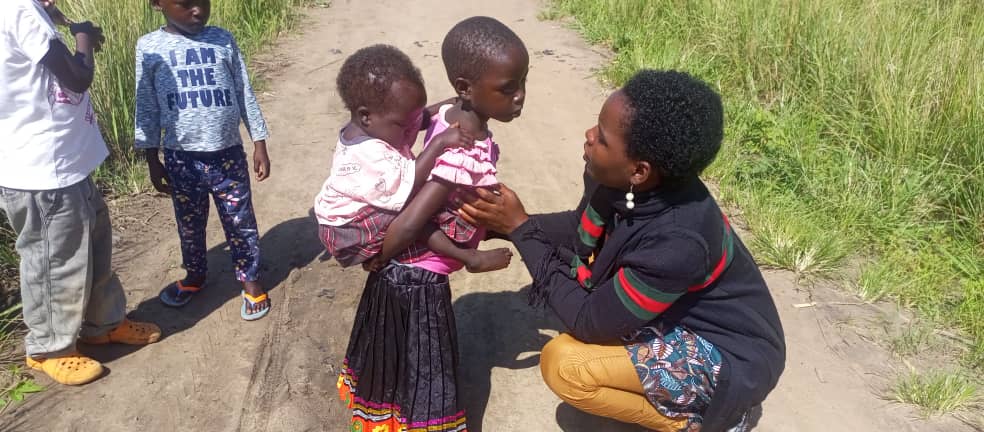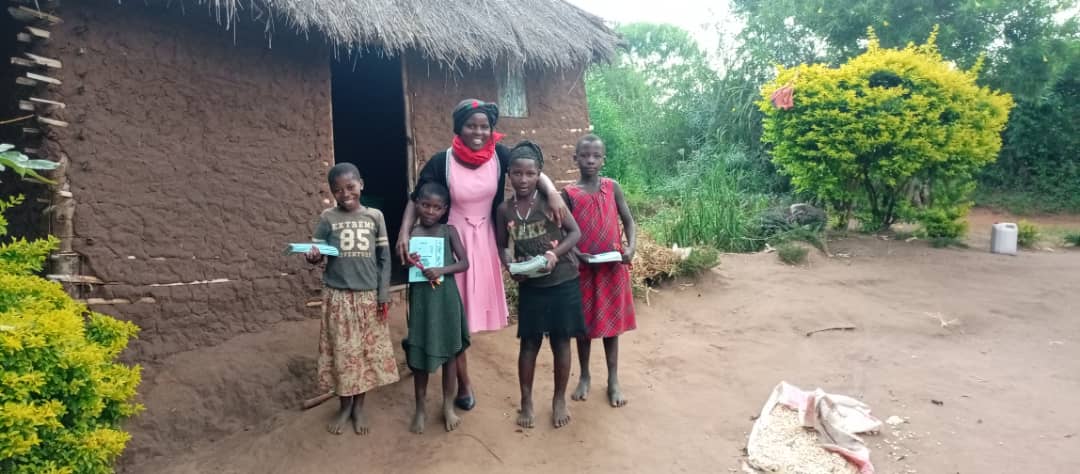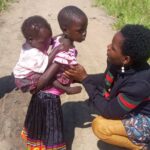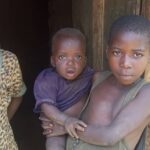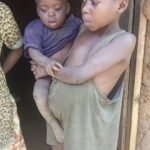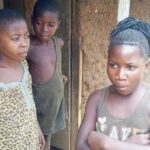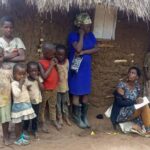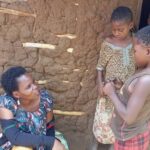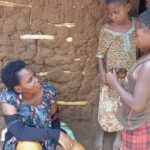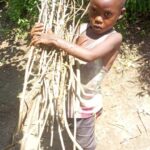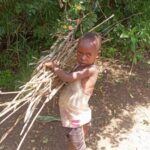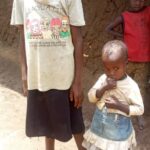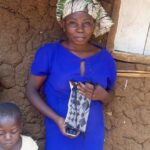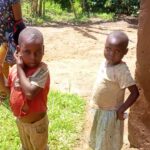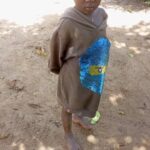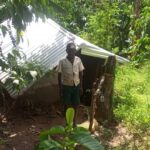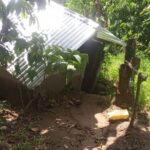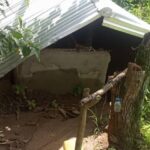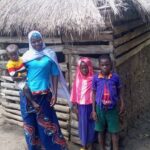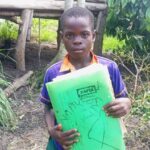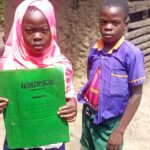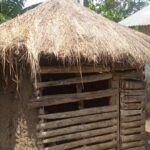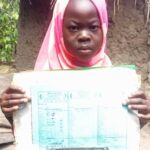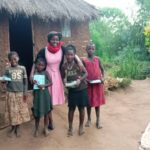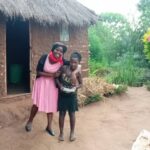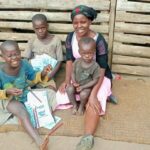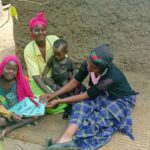About Kanungu Aids Orphans Project (KAOP):
The Kanungu Aids Orphans Project was established in 2022 after the founder, Nahwera Jenipher, decided to take action to help others, who like her, had experienced suffering as a result of being raised in a violent and abusive family. She decided to start by buying a dozen books, pencils and pens, and giving them to those in need, including orphans and other vulnerable children suffering from HIV/AIDS and/or broken families.
Location:
Kibimbiri parish, Kihihi Sub County, Kanungu District – South Western Uganda.
Objectives of KAOP:
- To reduce sexual violence against children in Kanungu district households.
- To provide a safe home environment for orphans and vulnerable children.
- To provide a quality education, nutrition, and food security to HIV/AIDS affected children.
- To promote agriculture for income generation and environmental conservation.
- To equip survivors with skills to help them improve their lives.
Who we serve:
Children and Youth
- Who have lost their parents/caregivers and are homeless, or in need of alternative family care.
- Who have been abused or neglected, have a disability, have been victimized into performing child labor, or are affected by HIV/AIDS or other diseases.
- Who live in ‘hard-to-reach’ areas or are affected by wild animals in Queen Elizabeth National Park.
- Who are in conflict with the law.
What we do:
- Provide love, guidance and attention so children and youth can overcome their trauma and become healthy, active community members.
- Strengthen social supports to protect and promote the welfare of children and youth.
- Link children and youth with service providers to help meet their needs.
- Mobilize resources to improve the care and support of children and youth.
- Encourage community discussions to identify and discourage cultural and religious norms and practices that negatively affect orphans and other vulnerable children.
- Prepare and disseminate reports about the outcomes of our services.
The role of children and their households:
The orphans and other vulnerable children will:
- Participate in identifying factors that cause their vulnerability.
- Participate in identifying and planning initiatives that improve their welfare.
- Participate in monitoring the implementation of the identified interventions.
Current situation of orphans and other vulnerable children and youth in Uganda:
Poverty
Poverty prevents the enjoyment of basic human rights, security and wellbeing. The rapidly increasing population of Uganda, coupled with the low resource base has put significant pressure on the delivery of basic social services, particularly to children. In Uganda, 38% of the population lives in absolute poverty, with children constituting 62% of the poor. The number of children who live below the poverty line is likely to rise due to the high fertility rate, HIV/AIDS, other preventable diseases, and insecurity. Other causes of poverty include:
- limited access to and control of productive assets, especially by women
- limited utilization of improved production technologies
- large families
- alcoholism
- unemployment/underemployment
- lack of markets
- inadequate opportunities for education
- lack of information
Poor Access to Healthcare
Despite the efforts of the health sector in service delivery, the demand for health services is growing while access to health services at the community level remains limited. The cost of ill health, which includes treatment costs, productivity loss and interrupted school attendance is crippling, particularly to children and the poor. Women and children bear a disproportionate amount of the burden of ill health. Infant and under-five mortality rates are currently at 88 and 152 out of every 1,000 born alive respectively, while the maternal mortality rate is 504 per 100,000. Stunting as a consequence of malnutrition in children less than five years is 39%, which indicates that access to food is one of the top concerns for children and the poor.
Barriers to Education
Education as a means of fighting poverty and reducing vulnerability is one of the top priorities for children. The Government has given due attention to basic education, resulting in a substantial increase in primary school enrolment, particularly for the poorest quintile, and for girls. Unfortunately, there has been a decline in primary school retention in the past few years due to high dropout rates. Furthermore, regional, rural and urban disparities still exist in school enrolment with a higher proportion of children enrolled in urban areas and the relatively more prosperous central region. The main barriers to access and full participation of children in education include: costs of scholastic and basic requirements; cost of post primary schooling; disability; ill health; early marriages; teenage pregnancy; sexual harassment; heavy burden of household chores; distance to school; insecurity; and poor nutrition or no meals both in schools and at home. In spite of the Universal Primary Education (UPE) Programme, XX% of primary school age children were not in school. In addition, many more children who were in school were not consistently attending classes. Consequently, the transition rate from primary to post-primary and tertiary levels has been low and very few children are now likely to complete primary and continue to higher levels of education.
Pandemic Increases Number of Orphans
Since the pandemic started, the country has lost about one million people and this has contributed significantly to an estimated 2.3 million orphans. Approximately 14 percent of children in Uganda less than 18 years of age are orphans, among those, 20 percent of children 6 – 17 years are orphans. Even if the fresh HIV infections ceased today, the population already infected constitutes a massive potential for swelling the number orphans in the country.
Ugandan communities have traditionally absorbed orphans within the extended family system. One in four households in Uganda foster at least one orphan by providing for health, shelter, nutrition, education and other needs. However, many of these care-givers are overburdened and often lack the socio-economic capacity to provide adequate care and support for these children. Community organizations, religious bodies and other civil society members have stepped in by providing information, vocational skills training, basic education, medical care, and counseling and micro-credit services. These groups too, often lack the human and financial resources to adequately respond to the problem. Many children who are orphaned are forced to live on the streets, or under exploitative conditions of labor, sexual abuse, prostitution and other forms of abuse. Many live in child-headed households where they have to fend for themselves and support their younger siblings. Some of these children are infected with HIV either through mother-to-child transmission or through defilement.
Success Stories: Children and Youth Helped by KAOP
We have rescued some children from very horrible situations of violence and sexual abuse, and take them back to school. Their stories are too sad to share here, so contact us if you like to know more about these children how you can help them. In addition, we have also been able to provide school materials to some needy children.
How you can contact us:
How you can help:
- You can make a general contribution of any amount that we can use to support these children. Contributions to this program via the USA-based 501(c)3 nonprofit Sahaya International are tax-deductible in the USA. Sahaya International will forward all donations to BACHO-K in Uganda, which will forward it to KAOP. If you like to make a contribution, you can do so in different ways:
- To pay by credit card or paypal, click on the button below, which takes you to our secure donation form. If you like to assign your donation to a specific program of KAOP, then enter that in the notes section. Otherwise we will use your donation where the needs are the highest.
- You can mail a check, made payable to “Sahaya International” to us. Add in the notes field “KAOP”.
Sahaya International
1504 Portola Street
Davis, CA 95616
Many thanks for your support!
(click on individual picture to see enlarged version)
